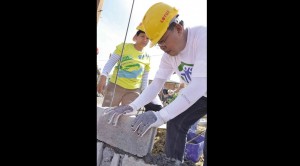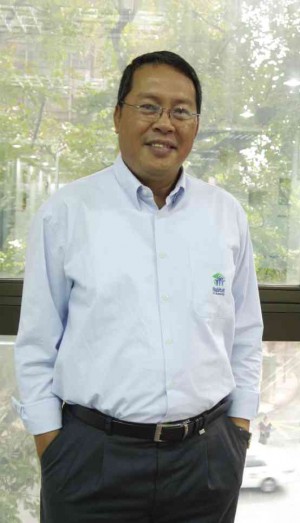For Charlito “Charlie” Ayco, chief executive officer and managing director of Habitat for Humanity Philippines, there is no work more meaningful and fulfilling than helping people. His years of experience working with Habitat further strengthened his mission in life, which is to serve God and man.
Habitat for Humanity International is a nonprofit, nongovernment organization founded by Millard and Linda Fuller in 1976 in Georgia, USA. It helps build affordable and durable houses for less privileged families around the world.
In the Philippines, Habitat for Humanity was established in 1988.
Public service is nothing new to Ayco, who was a seminarian, professor and politician prior to joining Habitat as a volunteer in 1997. He held various positions in Habitat here and abroad before assuming the CEO post in 2012.
A native of Bohol, Ayco holds an AB Philosophy degree from the Immaculate Heart of Mary Seminary in Tagbilaran, graduating cum laude in 1978. He has an MA in Theology at the Ateneo de Manila University, and a Master’s degree in Development Management, graduating with distinction from the Asian Institute of Management. He took up his doctorate in Ateneo, but he still has to complete his dissertation in Social Psychology.
He used to think that one has to be a member of a religious order to serve God, but he realized later that he could be of service to God and others in many other ways, even while raising a family.
Hometown OIC
Ayco was an associate professor at the Ateneo when the Edsa Revolution took place. This was a turning point for the young professional because President Cory Aquino later appointed him OIC mayor of his hometown, Sevilla in Bohol.
“I thought, all my life I would be in the academe. When I was offered to become OIC mayor, I felt it’s an opportunity for me to really do something for my town,” recalls Ayco.
Sevilla, he says, used to be a very poor town. He felt at the time that it was only proper to do something to help his townmates.
Only in his 20s at the time, Ayco became one of the youngest mayors in the country. Right away, he wanted to introduce a new way of governance. In 1988, he ran for election and went on to serve as mayor until 1992.
After his stint in politics, Ayco and his family remained in Bohol where he became executive director of First Consolidated Rural Bank Livelihood Foundation. Later, he went back to Manila to further his studies.
“I need to learn more. I have so many ideas and I need to validate if what I’m doing is right or wrong. So, I applied at the Asian Institute of Management and took a Master’s degree in Development Management. Many of the things I did as mayor were validated. Tama naman pala ang ginagawa ko (I was doing something right all along),” says Ayco.
Deeply moved
While working in a company as a business development consultant, the mayor of Tagbilaran asked him for help in the city’s housing project, which was being undertaken with an organization called Habitat for Humanity. Ayco said yes and became a volunteer. He later on became the founding president of Tagbilaran City Habitat for Humanity Foundation.
He remembers vividly how, for the first time, he showed the housing site to the beneficiaries, and was deeply moved by what he saw.
“As soon as we reached the place, the children started running around the site. It was the first time they were able to have a playground,” Ayco shares, remembering that his own son was of the same age as the boy he saw.
“It’s just a twist of faith na hindi yun ang naging anak ko (that the boy I saw playing was not my son). It could have been different,” he says.
From then on, he vowed to devote more time to Habitat and share in its vision of “a world where everyone has a decent place to live.”
Habitat for Humanity’s mission is “to put God’s love into action and bring people together to build homes, communities and hope.”
“Being a Christian organization, our first principle is, we want to demonstrate the love of Jesus Christ. We do not evangelize, we do not proselytize… the organization was founded on basic Christian principles,” the CEO says. “Our motivation is to put God’s love into action. That’s what differentiates us from a secular organization. As our founder says: ‘Faith is not something we just talk about, and love is not something that we just sing about; it is something that we have to act out.…’ You do it.”
When former US president Jimmy Carter and wife Rosalynn, one of Habitat’s famous volunteers, came to the Philippines in 1999 for the Jimmy Carter Work Project, Habitat’s advocacy became more popular and the housing issue became mainstream, Ayco says.
After that project, Ayco was invited by Habitat Philippines to join its staff as area director for the Visayas and Mindanao. He later became regional program manager of Habitat for Humanity International for East and Southeast Asia before becoming chief operating officer of Habitat Philippines.
But something happened that almost compelled him to quit the job he is truly passionate about.
He and wife Cynthia Reyes have two children, Karla and Renzi.
“When I became COO, I traveled a lot and, as a result, I became a weekend father. One day, when I was leaving home for work, my son cried, hugged me real tight and begged me not to leave. It was ironic for me because, here I am, helping out families, building houses, while my own family suffers. So I went to Manila and tendered my resignation,” says Ayco.
Passionate
When Habitat International learned of his desire to resign, it offered him an option—a post in its regional office in Manila and, later on, an office in Bangkok where he could bring along his family. Ayco agreed and the family stayed in Bangkok for seven years. There, Ayco first became Habitat’s director for Regional Programs and later, director for Program Development and Support.
Ayco is very passionate about helping solve the housing problem in the country, which has been crippled by a backlog of about four million houses from 2001 to 2011, according to a study by the University of Asia and the Pacific.
The UN, he says, considers housing to be a basic human right. Habitat’s founder (Millard) also considers it a “platform for development.”
Ayco cites a study that shows the economic benefits of investing in housing that may help boost the country’s economy.
Habitat Philippines has built thousands of houses and, to date, continues to build more all over the country. It hopes to reduce the country’s housing backlog by at least 20 percent by the year 2020.
Disaster response
Rebuild Philippines aims to meet the shelter needs of communities affected by supertyphoon “Yolanda” and other natural calamities. Its disaster-response program provides emergency and shelter repair kits, while it builds core houses for affected families.
Habitat Philippines is also taking part in the government project to relocate informal settlers living in danger zone areas, particularly near the waterways of Metro Manila.
Habitat partners with donors, various sectors, NGOs, government agencies, volunteers and construction experts to implement the projects. Ayco says their philosophy is not only to provide houses, but also promote holistic community development. He mentions, for instance, an agreement with Couples for Christ for it to take care of Habitat communities’ values formation.
Nothing compares
Ayco says nothing compares to the happiness of beneficiaries whenever Habitat turns over a completed house.
“You can really see people sometimes jump for joy and cry because what we gave them was very tangible. They’re very thankful. It’s a new life for them because, if you compare where they came from to where they are now, there’s really a big difference,” he explains.
Although his hands are always full, seeing to the day-to-day operations of Habitat Philippines, Ayco definitely enjoys his job.
“My friends would often tell me, ‘we envy you. For us, during the week we, go out and we work to earn money, and then we find ways to help other people…. Your work is actually to help people.’”
Ayco says that whenever he invites people to join Habitat as volunteer or be a member of the staff, “I always tell them I cannot promise you money. I can only promise you one thing, and I’ve seen it again and again—the huge sense of satisfaction and fulfillment. I think there is nothing greater than that.”



